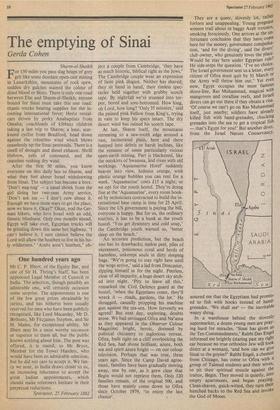The emptying of Sinai
Gerda Cohen
Sharm-el-Sheikh
For 150 miles you pass slag heaps of grey grit like some desolate open-cast mining in Lanarkshire, mountains of rock spew, sudden dry gulches stained the colour of dried blood or Bisto. There is only one road between Elat and Sharm-el-Sheikh; anyone bound for Sinai must take this one road: titanic trucks bearing supplies for the in- coming international force; Hertz rental- cars driven by perky Anabaptists from Omaha; coachloads of kibbutz children taking a last trip to Sharm; a lone, scar- kneed cyclist from Bradford, head down against the relentless wind which blows ceaselessly up the Sinai peninsula. There is a smell of drought and diesel exhaust. Shrill Hebrew, yells of command, and the ceaseless rushing dry wind.
After the first 50 miles, you know everyone on this daily bus to Sharm, and what they feel about Israel withdrawing from Sinai. The subject has become a bore. 'Don't nag-nag' — a nasal shriek from the girl doing her two-year Army service, 'Don't ask me — 1 don't care about it. Enough we have three wars to get the place, now we leave it. Okay?' Okay, nod the Ger- man hikers, who love Israel with an odd, fanatic blindness. Only two months ahead, Egypt will take over, Egyptian trucks will be grinding down this same hot highway. 'I can't believe it, I sure cannot believe the Lord will allow the heathen to live in his ho- ly wilderness.' Arabs aren't heathen,' ob-'
ject a couple from Cambridge, 'they have as much historic, biblical right as the Jews.' The Cambridge couple wear an expression of faint pink disgust. Neither has shaved; they sit hand in hand, their rimless spec- tacles held together with grubby scotch tape. By nightfall we're stunned into tor- por, bored and sore-bottomed. How long, oh Lord, how long? 'Only 35 minutes,' said the pained pink. Fellow from King's, trying in vain to keep his specs intact. The dry desert wind has ruined his scotch tape.
At last, Sharm itself, the mountains retreating to a saw-tooth edge around a vast, incinerated plain, here and there lumped into debris or harsh inclines, like the remains of some particularly vicious open-earth mining. Part is blackened, like the outskirts of Swansea, and riven with old workings. 'Aquamarine Hotel' suddenly heaves into view, hideous orange, with plastic orange bubbles you can rent for a week. 'Aquamarine' costs f15 a night; -so we opt for the youth hostel. They're doing fine at the 'Aquamarine', every room book- ed by technicians contracted to build the in- ternational base camp in time for 25 April. Since the US government is paying the bill, everyone is happy. But for us, the ordinary tourists, it has to be a bunk at the youth hostel. 'You get dysentery and cold soup,' the Cambridge youth warned us, 'better sleep on the beach.'
An accurate prediction, but the beach too has its drawbacks; melon peel, piles of excrement, poisonous coral and herds of harmless, unkempt souls in dirty sleeping bags. 'We're going to stay right here until the wogs arrive,' said a lad from Doncaster, zipping himself in for the night. Peerless, clear of all impurity, a huge desert sky arch- ed into night. 'Pity to leave all this,' remarked the Civil Defence guard at the hostel, 'when the Egyptians come, they'll wreck it — roads, gardens, the lot.' He shrugged,. casually propping his machine gun against the tea-urn. How fervently we agreed! But next day, exploring, doubts arose. We had envisaged Ofira and Na'ama as they appeared in the Observer Colour Magazine; bright, heroic, doomed by political chicanery to inglorious retreat. Ofira, built right on a cliff overlooking the Red Sea, had shone brilliant, azure, both sea and spirit azure bright — on our colour television. Perhaps that was true, three years ago. Since the Camp David agree- ment, families have been gradually moving away, one by one, as it grew clear that Begin would not reprieve them. Only 120 families remain, of the original 500, and those have mainly come down to Ofira since October 1979, `to enjoy the last chance'. They are a queer, slovenly lot, rather forlorn and unappealing. Young pregnant women trail about in baggy Arab trousers, smoking ferociously. One arrives at the un- fortunate conclusion that they have come here for the money, government compensa: tion, 'and for the diving', said the divers club owner, who genuinely loves the place. Would he stay here under Egyptian rule? He side-steps the question. 'I've no choice. The Israel government sent us a letter, every citizen of Ofira must quit by 31 March or the Army will throw him out.' Yet even now, Egypt occupies the most famous shore-line, Ras Muhammad, magical with mangroves and coralline reefs, and Israeli divers can go out there if they obtain a visa. 'Of course we can't go on Ras Muhammad itself, just nearby; soldiers have already killed fish with hand-grenades, chucking grenades into the sea to get a tropical fish — that's Egypt for you!' But another diver, from the Israel Nature Conservancy, assured me that the Egyptians had promis- ed to fish with hooks instead of hand- grenades. 'We shall see' — the inevitable weary shrug. In a warehouse behind the slovenly supermarket, a dozen young men are pray- ing hard for miracles. 'Sinai has given as the Ten Commandments,' Rabbi Day Engel informed me brightly (staring past my right ear because no true orthodox Jew will look direct at a woman), 'and how can we give Sinai to the goyim?' Rabbi Engel, a chemist from Chicago, has come to Ofira with a group of Talmud students and their wives, to pit their spiritual muscle against the traitor, Begin. They moved in quietly, into empty apartments, and began praying. Clean-shaven, quick-witted, they turn their hunched backs to the Red Sea and invoke the God of Moses.




































 Previous page
Previous page